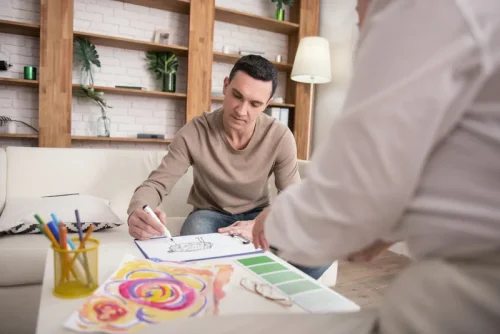Alcohol and Anxiety: Panic Attacks After Drinking

Generalized anxiety disorder involves chronic, exaggerated worry about everyday life. Even one drink can interrupt the natural cycles of sleep, causing a nervous or irritable feeling the next morning. Alcohol is a mild anesthesia and will put you in the mood for sleep — at least initially. Later in the sleep stages, alcohol disrupts REM sleep and paralytic sleep, which is when your body rejuvenates itself. The more you drink the greater your tolerance for alcohol – meaning you need to drink more alcohol to get the same feeling.
Healthy Lifestyle Habits
If you rely on alcohol to mask anxiety, you may find you become reliant on it to relax – putting you at risk of alcohol dependence. In fact, if you’re experiencing anxiety, drinking alcohol could be making things worse. Alcohol can cause a panic attack while we’re drunk or after we drink, and it can does alcohol trigger panic attacks increase our risk for a panic attack to recur. Panic attacks are unnerving, but there are strategies that can help us prevent them. Since alcohol can directly trigger panic attacks, these positive habits to help us quit or cut back can help us maintain emotional stability. While everyone may experience anxiousness from time to time, a person who has an anxiety disorder often finds their anxiety doesn’t go away and may actually get worse with, or without provocation.
- Our team does their best for our readers to help them stay informed about vital healthcare decisions.
- Alcohol use disorder (AUD) is a chronic brain disease characterized by compulsive alcohol use, loss of control over intake, and negative emotional states when not using.
- As the body adjusts to functioning without alcohol, the nervous system becomes overactive.
- A panic attack is a sudden episode of intense fear that triggers severe physical reactions when there is no real danger or apparent cause.
- Therapists may use exposure therapy to gradually reduce anxiety responses to alcohol-related triggers.
Your addiction does not have to define who you are.
According to the World Organization, approximately 70 percent of people experience a traumatic event during their lifetime. These can cause different reactions in individuals, including stress. While not always related to stress, emotional reactivity is defined as a…
Traditional ways of treating anxiety
Talking therapies like CBT (cognitive behavioural therapy), can help you learn to spot unhelpful patterns of behaviour and help you to develop coping strategies. The best way to prevent panic attacks from alcohol is to quit or cut back. Other practices that can help us “cure” them involve finding emotional stability. We can practice things like meditation and deep breathing, spending time in nature, and getting exercise. Panic attacks can leave us feeling scared, uncomfortable, and vulnerable. When we don’t have healthy ways to manage these feelings, we might turn to alcohol to cope.
- As a result, the best way to prevent panic attacks after drinking is to know your limits and avoid drinking to excess.
- Studies show that many people with ADHD are prone to “stimming.” Stimming and other repetitive behaviors help some individuals with ADHD regulate their focus or attention.
- Our psychologist offers individually personalized cognitive behavior therapy for clients in a private upscale setting.
- People with generalized anxiety or panic disorder are more likely to develop unhealthy drinking behaviors around the same time that they start having symptoms of their anxiety-related mental health condition.
- If you believe you or someone you love has anxiety that gets worse with alcohol use, you or your loved one can take steps to treat their anxiety and cut down or stop drinking.
- But once you start drinking, you can build a tolerance to the de-stressing effects of alcohol.
- It’s best to focus on taking slow, deep breaths to avoid hyperventilating.
- Instead of alcohol, consider talking to a mental health professional about effective anxiety management options, which may include psychotherapy and medication.
If you are sensitive to the effects of alcohol, these uncomfortable sensations can trigger a panic attack. As well as being an unhealthy coping mechanism, cases of alcohol-induced panic attacks prove that alcohol can actually be the cause of anxiety and panic rather than the cure. If you are not struggling with alcohol addiction, cutting out drinking is more of a personal choice. Hypersensitivity is when a person is so sensitive to changes in their body that they can’t help but notice and be affected by them. Every day most of us experience minor aches, pains, heart rhythm changes, and so on. Most people barely notice them, or pass them off as if they’re not important.

